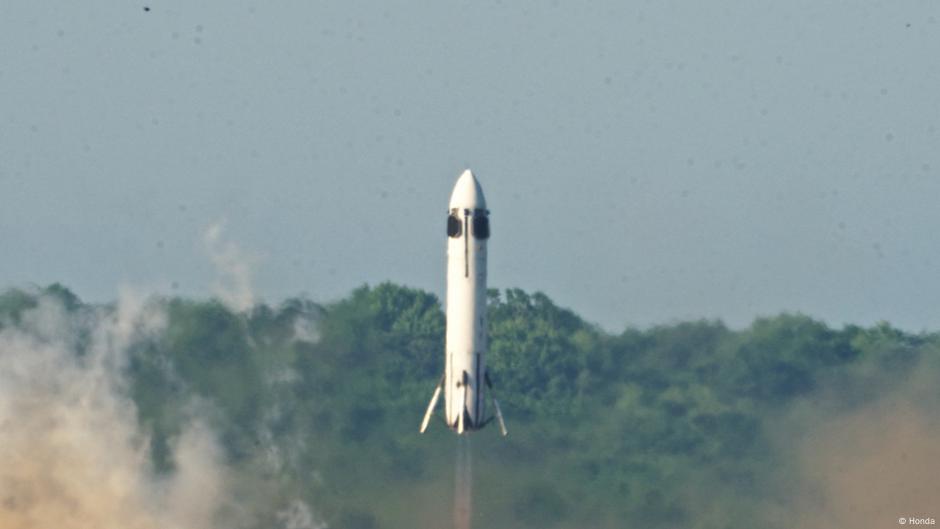Honda says growing expectations of a “data system in outer space” are going to increase the demand for rockets to launch satellites. So, the Japanese automaker quietly built one and tested it successfully.
Japan’s second-largest carmaker, Honda, has successfully tested an experimental reusable space rocket on the nothern Japanese island of Hokkaido, the company said in a surprise announcement.
“The test was completed successfully, the first time Honda landed a rocket after reaching an altitude of nearly 300 meters (1,000 feet),” the company said in a statement on Tuesday.
The carmaker aims to achieve suborbital space flight in 2029. In 2021, Honda said it was studying space technologies such as reusable rockets but made no announcements prior to Tuesday’s test



I love that space travel is becoming so democratized now.
It shouldn’t just be governments, it shouldn’t just be private companies, it should be anyone with the wherewithal to figure the technology out.
If your idea of ‘democratized’ is ‘now giant megacorps have comparable capital and assets to entire nation states’…
You have a very, very silly understanding of democracy.
Please explain to me how a giant mega corp is… democratic in nature.
You are describing cyberpunk style, hypercorporate techno-feudalism as democracy.
Democracy is one person, one vote.
Corporate governance structures can basically be boiled down to: one dollar, one vote, ie, oligarchy.
Yeah. Most of humanity has been propagandised into believing that corporations, which are run like dictatorships where < 1% are the majority shareholders who control the operation, are actually equivalent to “freedom” and “democracy”.
Clown world.
Uh hey, wanna learn Spanish and Basque proficiently, move to Spain, and try to convince Mondragon to branch out into spaceflight, lol?
Is always going to take a massive amount of resources to get to space.
Resources = wealth
Yes, exactly. Nobody is building and successfully launching a crewed mission to space from their garage. It will always be done by governments, companies, and the insanely rich.
that’s where ride-sharing could come in.
But the question is – why?
In the end, it’s a huge investment of resources; you can’t cheat physics. There is a theoretical floor (and a much higher practical floor) for what you need to get out of Earth’s orbit. And frankly, there isn’t that much to do for you in space as a layperson (not talking about actual astronauts who are rather scientists) except flex on other people.
Here’s infograph from nasa website but things like scratch proof lenses, hand vacuums, jaws of life, LED lights, etc…
https://www.jpl.nasa.gov/infographics/20-inventions-we-wouldnt-have-without-space-travel/
My argument wasn’t against space exploration in general, but rather the democratization of space travel as a commodity; as in as in we have already democratized it so far that the trophy wifes of billionaires can travel to space. I’m unsure of scientific advances that has brought and rather think this made someone money
That’s how airplanes were at first too. Eventually, once enough of the technology and engineering becomes finalized, everyday people can afford it.
With this technology we can use methane or hydrogen powered rockets, using only renewable resources, launch people from one side of the planet to the other in less than an hour.
Is this a good thing for the environment? It’s hard to say right now, it’s probably not great. Since the flights will be so short, maybe it’ll be better than the current air travel.
My original point was also that you’d need a real benefit compared to the currently available options. We did have faster air travel for a time with the Concorde (which looked a lot more like a spaceship than other aircrafts). It went away because it had a lot of downsides for only the advantage of being faster. Don’t get me wrong, I would have loved to use it one day just to witness it; but in the end, it doesn’t really matter if your trip takes slightly less time; keep in mind that it usually doesn’t start and end at an airport anyways, and this problem would be even bigger for space travel. So it isn’t really something for traveling on Earth. Which brings me back to the question what it would do for a layperson…
Apart from that, you need to time your departure and arrival with conditions on Earth, so while technically you could shorten that time drastically, you’d probably need to wait some months before you can take the trip.
My honest belief is that somehow, spaceflight is good for the people in the US because it creates jobs:
Think of how the Space Race of the 1960s brought jobs all across America. On top of that, it inspired a generation of scientists.
Both are valuable for a society, especially for the US, where these kinds of jobs are especially desirable.
The problem in the US isn’t lack of jobs, it’s lack of pay, crippling debt and rising cost of living. People have trouble fitting all those jobs into their lives. Normal people are getting squeezed and social protections are weak. More jobs won’t fix it
That you can think of. That doesn’t mean it isn’t worth exploring. Plenty of backyard scientists do some crazy innovation.
With the small detail that failures in your backyard are in general much less catastrophic compared to mishaps in space
That’s why the launching areas are typically huge areals where not many people live. On top of that, rockets are typically launched eastwards (due to earth’s rotation) and in coastal areas, so they fly the first few minutes over the ocean. Should something blow up, it does so over the sea, where it doesn’t matter too much.